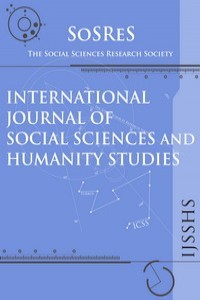A STUDY ON LEARNING APPROACHES USED AMONG POST-GRADUATE STUDENTS IN RESEARCH UNIVERSITY
A STUDY ON LEARNING APPROACHES USED AMONG POST-GRADUATE STUDENTS IN RESEARCH UNIVERSITY
learning approaches, deep approach, surface-disorganized approach, surface-rationale approach, post-graduate students, Research University,
___
- Chan, Y.K.R. (2010). The relationship between gender, age, study mode, locus of control, extracurricular activities, learning approaches and academic achievement: the case of full-time and part-time Hong Kong Chinese sub-degree students. School of Education Research Working Paper 2010. University of Leicester.
- Diseth, A., Pallesen, S., Hovland, A. & Larsen, S. (2003), Course experience, approaches to learning and academic achievement, Emerald Education + Training, Vol. 48 No. 2/3, 2006, pp. 156-169.
- Duff, A, Boyle, E, Dunleavy, K, Ferguson, J (2004). The relationship between personality, approach to learning and academic performance. Personalities and individual differences, 36 (2004) pp.1907–1920.
- Entwistle, N.J., McCune, V. and Walker, P. (2001), “Conceptions, styles and approaches within higher education: analytical abstractions and everyday experiences”, in Sternberg, R.J. and Zhang, L.F. (Eds), Perspectives on Thinking, Learning and Cognitive Styles, Lawrence Erlbaum Associates, London.
- Entwistle, N. J., & Ramsden, P. (1983). Understanding Student Learning (London Croom Helm).
- Evans, C. J., Kirby, J. R., & Fabrigar, L. R. (2003). Approaches to learning, need for cognition, and strategic flexibility among university students. British Journal of Educational Psychology, 73, pp.507–528.
- Fung, L.Y. (2010). A study on the learning approaches of Malaysian students in relation to English language acquisition. American Journal of Scientific Research, 9, pp.5-11.
- Kirby, J.R., Knapper, C.K., Evans, C.J., Carty, A.E., & Gadula, C. (2003). Approaches to learning at work and workplace climate. International Journal of Training and Development, 7(1), 31-52.
- Law, C.S. & Meyer, H.F. (2009). Relationships between students’ demographic background, subject areas, and learning patterns in post-secondary education of Hong Kong. In Wang et al. (Eds.): ICHL 2009, pp.431-432. Berlin: Springer.
- Lu, J., Yu, C.S. & Liu, C. (2003). Learning style, learning patterns, and learning performance in a WebCT-based MIS course. Information & Management, 40, pp.497-507. Magno, C. (2011). The use of study strategies on Mathematical problem solving. The International Journal of Research and Review, 6(2), pp.57-81.
- Penglase, M. (2004). “Learning approaches in university calculus: the effects of an innovative assessment program” University of Western Sydney, pp.446-453.
- Prat-Sala, M. & Redford, P. (2010). The interplay between motivation, self- efficacy, and approaches to studying. British Journal of Education Psychology, vol. 80, pp.283-305.
- Richardson, J.T.E. (2006). Investigating the relationship between variations in students’ perceptions of their academic environment and variations in study behavior in distance education. British Journal of Educational Psychology, 76, pp.867-893. Spicer, D. P. (2004). The impact of approaches to learning and cognition on academic performance in business and management. Emerald Education + Training, Volume 46 , No. 4, pp.194-205.
- Başlangıç: 2009
- Yayıncı: Sosyal Bilimler Araştırmaları Derneği
TACKLED - THE IMMERSION OF SOCIAL WORK PROFESSION INTO THE REALM OF HIGH COLLISION SPORTS
CONSTITUTIONAL ECONOMICS, FISCAL POLICY RULES, AND THE CASE OF TURKEY
Osman Nuri ARAS, Mustafa ÖZTÜRK
A TEST FOR ASYMMETRIC CENTRAL BANK PREFERENCES IN TURKEY
Mohamed S. EL-DEEB, Yasser TAWFİK, Mohga Bassim, Emad Elwy
BRAND POSITIONING THROUGH MULTIDIMENSIONAL SCALING: A STUDY IN THE TURKISH SHAMPOO MARKET
Faruk Anıl KONUK, Oylum KORKUT ALTUNA
INNOVATIONS AND CHANGES BROUGHT BY THE LISBON TREATY: THE SOCIAL ASPECT
ROLE OF TRUST IN BUILDING SOCIAL CAPITAL AND RURAL DEVELOPMENT
Zsolt BARANYAİ, Zsuzsanna Toth NAAR, Maria Fekete FARKAS
MODEL OF THE FACTORS AFFECTING THE CHOSEN WAY OF INSTITUTIONAL CATERING
Mónika Fodor, Ágnes Csiszárik-Kocsir, ágnes HORVÁTH, József LEHOTA
BOUNDARIES AND ETHNIC IDENTITIES THE CONCEPTION OF BOUNDARY IN A DIVERSE AREA
DID THE RECENT ECONOMIC CRISIS IMPACT REMITTANCES? EVIDENCE FROM TRANSITION COUNTRIES
